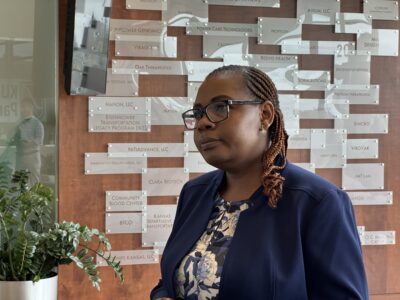Bioscience Authority appointment gives professor edge in cancer research

Blake Peterson is shown at the Structural Biology Center on Kansas University's West Campus. A new laboratory for Peterson's research is under way, funded by a million grant by the Kansas Bioscience Authority.
If Blake Peterson’s youthful interests and passions had gone awry, breakthroughs in treating cancer might be further away.
Peterson, who grew up in Reno where his parents taught at the University of Nevada, was named one of Kansas Bioscience Authority’s first two eminent scholars in January and now is a distinguished professor at Kansas University.
From his earliest years, he was interested in exploring and trying to understand the physical world.
“I was always interested in biology and chemistry and loved catching bugs and reptiles in the desert,” he said. “I made chemical volcanoes in the garage and was passionate about riding off-road motorcycles in the desert when I was a teenager.”
Luckily he survived these escapades and embarked upon his academic career.
He became interested in medicinal chemistry as a graduate student in chemistry at the University of California-Los Angeles. When his doctoral advisor, Francois Deiderich, moved to the Swiss Federal Technical Institute in Zurich, Peterson moved with him to pursue research under his guidance. He remained for more than two years before returning to Harvard University for postdoctoral research in biochemistry and molecular biology.
“The deep exposure to these very different fields was invaluable for future research in the medicinal chemistry and chemical biology fields where my work is focused today,” he said.
His fellowship sparked his interest in cancer research.
He continued his groundbreaking research during a nine-year period at Pennsylvania State University before moving to KU’s department of medicinal chemistry in 2007. His wife, Rebecca, executive assistant dean in the College of Liberal Arts and Sciences, and his two children (and another on the way at press time) enjoy living in Lawrence.
Peterson’s research will be housed in a new laboratory in KU’s Structural Biology Center on the West Campus, which is being funded by a $5 million Bioscience Authority grant. The new facilities will enable Peterson to continue to create the new technology platforms that could be useful for treating cancer and other diseases.
“We’re developing new methods for the delivery of anti-cancer drugs specifically into cancer cells without harming normal cells. We’re studying our unique groundbreaking technology that involves using chemistry to create drug-carrying molecules that resemble cholesterol,” he explained.
He believes that metastatic cancers are among the most difficult to treat and that many patients are killed when the disease spreads to other parts of the body. He’s hopeful that his cholesterol mimics can be designed to deliver drugs selectively to metastatic cancer cells.
“Only the cancer cells would get the anti-cancer drug dose, and other cells would remain healthy,” he said. “This new type of drug delivery system would be broadly useful for treating a number of different types of cancers, including those of the breast and prostrate.”







